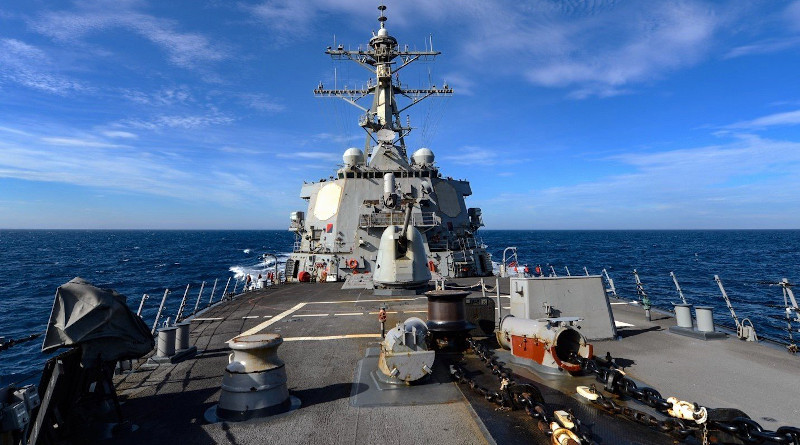China Calls US Warship’s Taiwan Strait Transit A Provocation
By VOA
By Joyce Huang
Chinese state media and internet users Friday accused the United States of making “another provocative move” as a warship sailed through the Taiwan Strait — the seventh such transit by the U.S. Navy this year, at a time when the island mourns victims of China’s 1989 Tiananmen Square protests.
The transit by the U.S. Arleigh Burke-class guided missile destroyer USS Russell (DDG-59) at dawn on Friday was the second passage in three weeks by U.S. Navy vessels through the narrow channel of water separating Taiwan and China.
While Chinese officials made no mention of the transit on Friday, state media, including the Global Times newspaper, were quick to call it a “provocation,” citing earlier comments by China’s military spokesman, Ren Guoqiang.
According to the paper, Ren, in March, denounced “continued negative actions” by the U.S. on Taiwan, including sailings through and flights over the sensitive waters amid heightened political tension between the two governments.
Provocation?
“U.S. moves have seriously interfered in China’s internal affairs, severely harmed peace and stability in the Taiwan Strait and poisoned Sino-U.S. military ties,” Ren said at a monthly news conference.
The actions were “extremely dangerous,” he added during the March event.
Most Chinese netizens also reacted to the news with nationalistic sentiments.
One user on Weibo, China’s Twitter-like microblogging site, wrote, “[the U.S.] is deflecting by staging a war against China so that [U.S. President Donald] Trump will win his re-election.” Another user said, “Let’s take the U.S. [vessel] down so that it won’t bother to come in the next ten months.”
But some agreed that the U.S. was sailing harmlessly through the open sea.
“It’s in the high seas. Let it pass. What difference does it make if it is the 7th or the 17th transit?” one user said.
Freedom of navigation operations
According to USNI News, associated with the U.S. Naval Institute, Commander Reann Mommsen, a U.S. 7th Fleet spokesman, confirmed that “Russell conducted a Taiwan Strait transit June 4 to 5 (local time) in accordance with international law. The ship’s transit through the Taiwan Strait demonstrates the U.S. commitment to a free and open Indo-Pacific. The U.S. Navy will continue to fly, sail and operate anywhere international law allows.”
The vessel is currently deployed to the U.S. 7th Fleet, which took the initiative in sharing photos of the transit on Facebook and Twitter early Friday.
The U.S. warship’s transit was made days after China’s newest aircraft carrier, Shandong, was reportedly operating in the Yellow Sea after leaving the Dalian Shipyard, USNI News reported.
After its launch in April of 2017, Shandong, in late December, conducted a second transit through the Taiwan Strait.
China’s military drills
Analysts say routine U.S. freedom of navigation operations help strengthen its commitment to support the region’s security and stability when China undertakes rigorous military drills at Bohai Bay near Tianjin between mid-May and the end of July. They precede another massive exercise planned for around August in the South China Sea.
Both rounds of drills are said to be aimed at Taiwan.
“They (China) use this kind of military exercise as kind of a [political] propaganda to scare Taiwan and to intimidate Taiwan,” said Arthur Ding, an adjunct research fellow at National Chengchi University’s Institute of International Relations in Taipei.
The researcher noted that the USS Russell’s transit also helped reaffirm American support for a democratic China shortly after U.S. Secretary of State Mike Pompeo met former Chinese student leaders, including Wan Dan of the Tiananmen Square protests that were brutally put down by the Chinese Communist Party (CCP) on June 4, 1989.
Ding added, in light of China’s increasing assertiveness toward Taiwan, the U.S. has beefed up its military presence in the region after the island recently gained traction from the international community with its success in containing the coronavirus.
That, however, riled China as it undermines Beijing’s one-China principle.
U.S. naval vessels passed through the area a total of nine times last year, according to local media.
Ding said China’s increasing assertiveness may end up hurting its relations with Western countries, particularly the U.S., many of which are considering toughening their positions on China.
Rebuild US-Taiwan ties
In their commentary, published on the Hoover Institution’s website last week, U.S. law professors John Yoo and Robert Delahunty argued that, amid its intensifying confrontation with China, the U.S. endorsement of the one-China policy is not in its own interests.
“Allowing the CCP [Chinese Communist Party] to possess Taiwan would inflict a serious strategic blow to the United States. Beijing would gain an advanced economy, a base for its thousands of ballistic missiles, and a deep-water port from which to project power into the midst of America’s regional allies,” the article read.
“The CCP could easily control the sea lanes through which passes one-third of the world’s shipping, threaten the ability of the U.S. 7th Fleet to operate and make military assistance for Japan, Korea, and Vietnam difficult,” it added.
Both commentators, who formerly served in the U.S. government, urged the U.S. not to bend to China’s pressure.
The U.S. “should consider rebuilding its military and political ties to the island. Taiwan, which General Douglas MacArthur once called ‘an unsinkable aircraft carrier,’ occupies a vital strategic position in the region,” they concluded.

